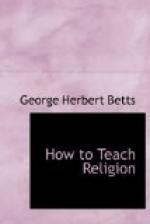For it is impossible to set up scholastic and professional standards for our teachers of religion as we do for the teachers in our day schools. The day-school teacher, employed by the state and receiving public funds, must go through a certain period of training for his position. He must pass examinations in the subject matter he is to teach, and in his professional fitness for the work of the teacher. He must have a certificate granted by responsible authorities before he can enter the schoolroom. He must show professional growth while in service if he is to receive promotion or continue in the vocation.
Greater personal responsibility on church school teacher.—Naturally, all this is impossible with volunteer teachers who receive no pay for their services and are not employed under legal authority. No compulsion can be brought to bear; all must rest on the sense of duty and of opportunity of the individual teacher. Yet the Sunday school teacher needs even a more thorough background of preparation than the day-school teacher, for the work of instruction in the Sunday school is almost infinitely harder than in the day school. Religion and morals are more difficult to teach than arithmetic and geography. The church building usually lacks adequate classroom facilities. The lesson material is not as well graded and adapted to the children as the day-school texts. The lessons come but once a week, and the time for instruction is insufficient. The children do not prepare their lessons, and so come to the Sunday school lacking the mental readiness essential to receiving instruction.
This all means that the Sunday school teacher must rise to a sense of his responsibilities. He must realize that he holds a position of influence second to none in the spiritual development of his pupils. He must remember that he is dealing with a seed-time whose harvest involves the fruits of character and destiny. With these facts in mind he must ask himself whether he is justified in standing before his class as teacher without having given the time and effort necessary for complete preparation.
The teacher and his Bible.—The teacher should know his Bible. This means far more than to know its text and characters. The Bible is history, it is literature, it is a treatise on morals, it is philosophy, it is a repository of spiritual wisdom, it is a handbook of inspiration and guidance to the highest life man has in any age conceived.
To master the Bible one must have a background of knowledge of the life and history of its times. He must enter into the spirit and genius of the Hebrew nation, know their aspirations, their political and economic problems, and understand their tragedies and sufferings. He must know the historical and social setting of the Jewish people, the nations and civilizations that surrounded them, and the customs, mode of life, and trend of thought of contemporaneous peoples.
Not all of these things can be learned from the Bible itself. One must make use of the various helps and commentaries now available to Bible students. The religions of ancient Egypt, Assyria, Babylonia, Greece, and Rome should be studied. Ancient literatures should be placed under tribute, and every means employed to gain a working knowledge of the social medium out of which the Christian religion developed.




